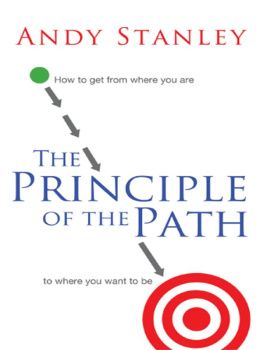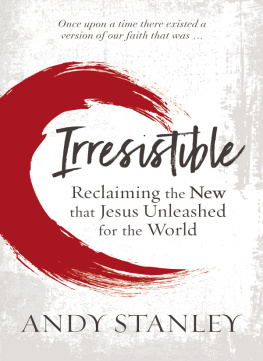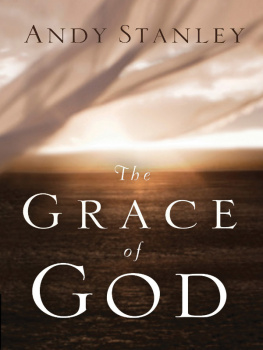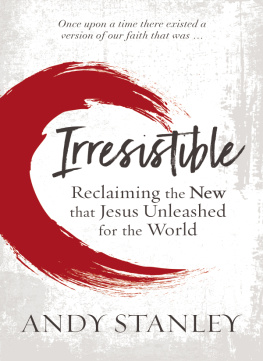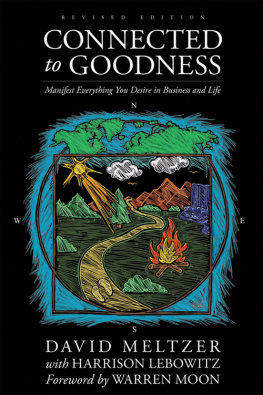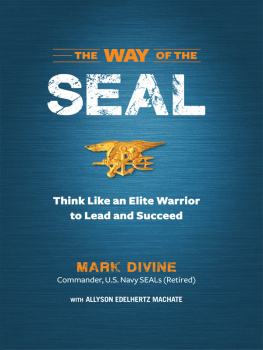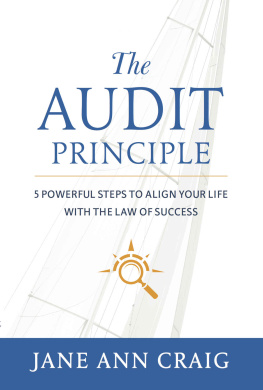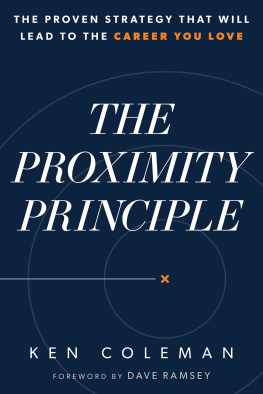PRAISE FOR
THE PRINCIPLE OF THE PATH
As Billy Grahams son, and a preacher myself, I have seen firsthand the devastating consequences of choosing the wrong path in life. Andy Stanley writes about the importance of following the path that is set before us as stated in the Bible. Proverbs 3:5-6: Trust in the Lord with all your heart, and lean not on your own understanding. In all your ways acknowledge Him and He shall direct your paths. May all who read these words be obedient in their daily walk with the Savior.
FRANKLIN GRAHAM
President & CEO, Billy
Graham Evangelistic
Association and
Samaritans Purse
As a young man, I did a lot of stupid things. Those dumb decisions and bad behaviors led me straight into bankruptcy and heartache. But once I changed directions and started doing smart things with my life and money, I started winning. Its really that simple. If you dont want to learn this life-changing principle like I didthe hard waythen you need to read Andy Stanleys The Principle of the Path. I just wish I had a copy of it twenty years ago!
When working with financially distressed families, one of the biggest challenges is getting them to see the series of bad decisions that got them into trouble in the first place. If everyone really understoodand appliedAndy Stanleys The Principle of the Path, I believe the whole financial landscape of America would change practically overnight.
I tell people every day, If you keep doing what youve been doing, youll keep getting what youve been getting.
Divorce, bankruptcy, foreclosure, failed businesses... these things dont happen overnight. Theyre the result of a consistent pattern of bad decisions. Usually all thats needed to turn someones life around is an intentional change of directionand thats exactly what Andy Stanleys The Principle of the Path is all about.
DAVE RAMSEY,
host of The Dave Ramsey
Show and best-selling author
of Total Money Makeover
Every once in a while a book comes along that causes me to adjust the way I see myself and the world around me. This is one of those books. The subtitle pretty much says it all. This book will help you get from where you are to where you want to be! Andy Stanleys practical, biblically grounded wisdom, self-deprecating humor, and personal example are why he is one of my favorite communicators.
JONATHAN RECKFORD,
CEO, Habitat for Humanity
International
If you know where you want to go, this book will help you get there.
MARK RICHT,
Head Football Coach,
University of Georgia
In what has immediately become my favorite Andy Stanley book (and that is saying something) the author provides proof that the choices one consciously makes today will revolutionize your life and leave a lasting impact upon the world. This book encouraged and energized me. It will allow you to see your own path with new vision.
Andy Stanley is one of three people on this planet whose wordsboth written and spokenhave most shaped the person I am today. While I still have miles to travel in becoming who I am supposed to be, I continue to be excited about the influence Andy has in my life and my role as a husband, a father, and communicator.
ANDY ANDREWS,
speaker and best-selling
author of The Travelers Gift
THE PRINCIPLE OF THE PATH
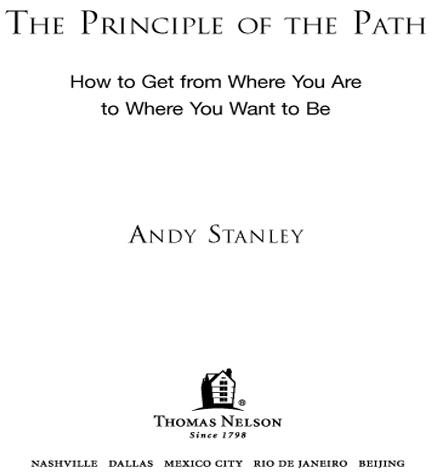
2008 by Andy Stanley
All rights reserved. No portion of this book may be reproduced, stored in a retrieval system, or transmitted in any form or by any meanselectronic, mechanical, photocopy, recording, scanning, or otherexcept for brief quotations in critical reviews or articles, without the prior written permission of the publisher.
Published in Nashville, Tennessee, by Thomas Nelson. Thomas Nelson is a registered trademark of Thomas Nelson, Inc.
Thomas Nelson, Inc. titles may be purchased in bulk for educational, business, fundraising, or sales promotional use. For information, please e-mail SpecialMarkets@ ThomasNelson.com.
Unless otherwise noted, Scripture quotations are taken from the HOLY BIBLE: NEW INTERNATIONAL VERSION. 1973, 1978, 1984 by International Bible Society. Used by permission of Zondervan Publishing House. All rights reserved.
Scripture quotations marked NASB are from the NEW AMERICAN STANDARD BIBLE. The Lockman Foundation 1960, 1962, 1963, 1968, 1971, 1972, 1973, 1975, 1977, 1995. Used by permission. Scripture quotations marked NKJV are from THE NEW KING JAMES VERSION. 1982 by Thomas Nelson, Inc. Used by permission. All rights reserved. Scripture quotations marked NLT are from the Holy Bible, New Living Translation. 1996. Used by permission of Tyndale House Publishers, Inc., Wheaton, Illinois 60189. All rights reserved.
Library of Congress Cataloging-in-Publication Data
Stanley, Andy.
The principle of the path : how to get from where you are to where you want to be / Andy Stanley.
p. cm.
ISBN 978-0-8499-2060-8 (hardcover)
1. SuccessReligious aspectsChristianity. 2. Christian life. I. Title.
BV4598.3.S72 2008
248.4dc22
2008050270
Printed in the United States of America
09 10 11 12 13 QW 5 4 3 2 1
To Louie Giglio
Our mothers must have prayed a lot!
TABLE
OF CONTENTS
In the category of Top Three Dumbest Things I Ever Did is my decision to ignore an oversized DetourRoad Closed sign and drive down a stretch of I-20 between Birmingham and Atlanta before that particular section of highway was officially opened. But I was eighteen and knew everything there was to know about anything.
Well, almost everything.
I was not alone. My good friend Louie Giglio and I had some business in Birmingham, Alabama. Somehow we overlooked the fact that Birmingham is on Central Standard Time, and consequently, it was an hour later at home in Atlanta. Im not sure how we overlooked that piece of trivia. We had driven to Birmingham that same afternoon and arrived at our appointment an hour early. Granted, we should have logged that detail away and planned our trip home accordingly. But we didnt.
We had promised our parents we would be back by midnight. That was after a long discussion about whether we should even go on this little jaunt across the state line. So we departed Birmingham at nine thirty, thinking we had plenty of time to make the return trip. But about twenty minutes down the road, it dawned on us that it was an hour later than we thought it was. And as fate would have it, that was about the time we arrived at the detour sign.
Back in the day, there was a twenty- or thirty-mile stretch of I-20 between Atlanta and Birmingham that for some reason the Department of Transportation just could not seem to finish. So vehicles were detoured off the interstate onto a single-lane road that meandered through a couple of small towns and a whole bunch of pasture, forests, and lowlands. The road eventually would dump back out onto the completed section of I-20, and off you would go. On our way to Birmingham that afternoon, we couldnt help but notice that the closed section of I-20 looked perfectly navigable... at least the section we could see. From what we could tell, all it lacked was stripes and guardrails.
So at 11:00 p.m., two hours from home with only an hour to get there, we made a really bad decision. We drove right between the words Road and Closed and headed on down the highway. Two things happened as we crossed into the great unknown. First, the notion of doing what nobody else was doing created an immediate adrenaline rush. Louie cranked up the radio, and we both rolled down our windows and began singing at the top of our lungs. I wont tell you what we were singing because that would date this story beyond recognition. There wasnt such a thing as a high five back then, so I doubt there was any actual body contact, but we were totally sure and full of ourselves in those initial moments. The second thing I noticed was that someone was following us. Fast.
Next page
